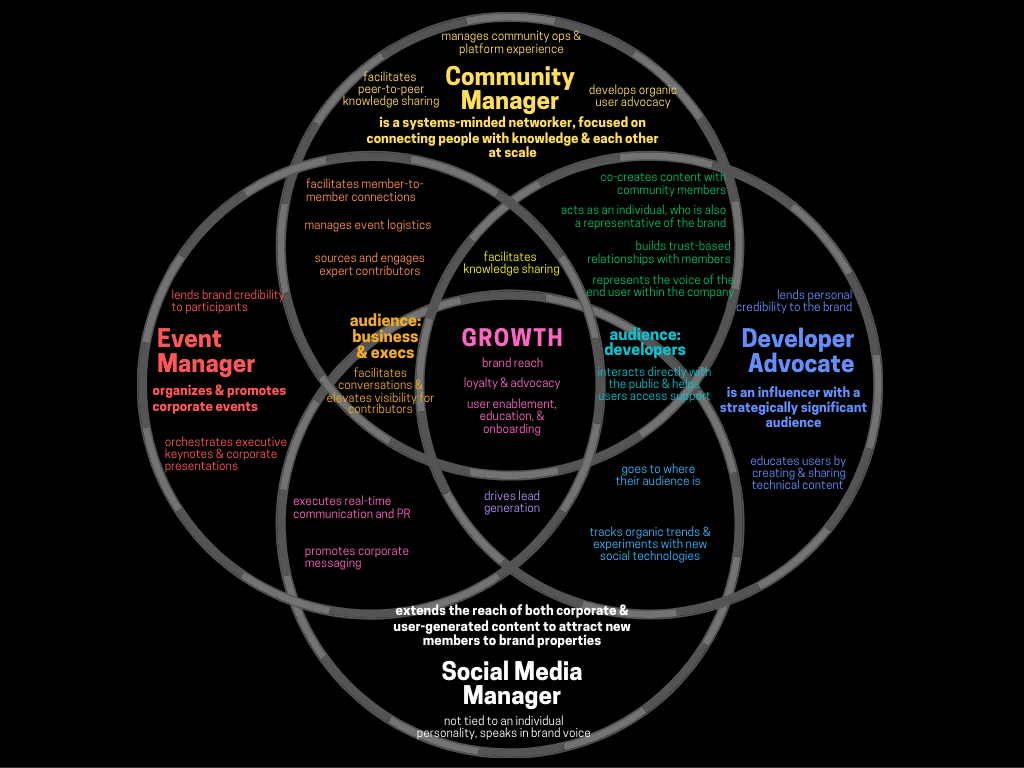One of the most common challenges for early stage startup founders is deciding who to hire when. Getting that first round of funding is a big deal because it means you can start to scale. With cash in hand, founders get to go from doing everything (poorly, in most cases) themselves to focusing on their core strengths and doing less things (better) at a time. It's unrealistic - especially in the Post-SVB Times - to try to hire a full suite of executive leaders; so, how do they prioritize which roles to hire in the beginning? This is the time for founders to think hard about their burning needs right now. This isn't the moment to plan for the future. If you blow a bunch of cash on the wrong hire early on, there may not be a future to plan for.
A burning need that most early stage companies experience is to build connections with their users that translate into adoption and organic growth. As someone who helps companies build momentum with PLG community programs, I can tell you that bringing in a community manager is often a good solution to this problem, but it may not always be the right solution.
If you hire someone to do a job that does not align with their skills, you are setting yourself, your team, and your new hire up for failure. It's important, then, that you know exactly what kind of job you are hiring for and the skills that will set your new hire up for success.
How can I figure out whether to hire a community manager or not?
There are a few characteristics of your business that you should think about when choosing whether a community manager is the right hire to meet your business needs, including:
your audience (enterprise vs. SMB; developer vs. business user; etc.)
the complexity of your product (is it easy to get started or is there a significant learning curve?)
your growth model (enterprise/sales-led vs. PLG/self-service/community-led)
your revenue model (open source vs. proprietary; subscription vs. perpetual licensing; etc.)
The most successful growth strategy, however, will be one that is strategic, intentional, and aligned to your business goals. (Learn more about aligning your community objectives to your business goals in my previous posts >>>)
Depending on your circumstances, your growth strategy, and your expectations, you may instead consider hiring another role entirely. Some common alternatives to a community manager might be: a developer advocate, an event manager, or a social media manager.
Universal Qualifications
While there are many roles that may overlap the scope of a community manager's role, I chose these four to focus on because they share many of the same core skillsets and are, in my experience, the most frequently confused. Some examples of those shared skills and qualities might include:
strong writing and public speaking ability
works well with minimal supervision
creative problem-solver
strong relationship-builder with people at any level of the organization
organized and reliable
able to clearly communicate complex topics to a variety of audiences
understands basic marketing principles
You can see how many shared goals, responsibility areas, and tactics there are between these roles in this diagram:
The Differentiators
For example, if you expect this person to be highly knowledgeable about a particular technology, programming language, or application, you should hire a developer advocate. If you want them to able to create code samples, to directly answer complex technical questions, or be able to speak about your product to your users at an industry conference, hire a developer advocate.
If you want this person to primarily plan and manage events, hire an event manager. If you want this person to be experienced at managing the logistics of large-scale corporate events, handling everything from liability insurance to catering, hire an event manager.
If you want this person to stay up-to-date on the latest buzzwords and social trends, be fearless in testing out new apps, and keep you in the loop on industry chatter, hire a social media manager. If you want them to spend most of their time planning and sourcing content to publish on your social channels, hire a social media manager.
BUT...
If you want your new hire to be able to:
manage multiple conflicting priorities
handle difficult personalities
develop relationships and trust amongst your users
build deep affinity for your brand
help users learn to use your product
increase product adoption and customer satisfaction
help you understand how users are experiencing your product
help you build the product your users will be happy to share with their friends
facilitate knowledge sharing amongst peers
empower community members to host their own events around your brand
influence positive behaviors without authority
encourage contributions without compensation
build a flywheel to drive user advocacy
...all at scale?
You might be ready to hire a community manager.
Hire Smarter By Knowing What You Want
You can ask an event manager to do social media things. You can ask a developer advocate to manage your community. You can ask your social media manager to hang out in developer forums. You can ask your community manager to run corporate events. And because they share many of the same core skills, they will all be able to execute on your asks to some extent for a while - until they hit the limit of their shared skills and interests. And you'll be left wondering what happened and why they failed or quit.
Stay salty, friends.


